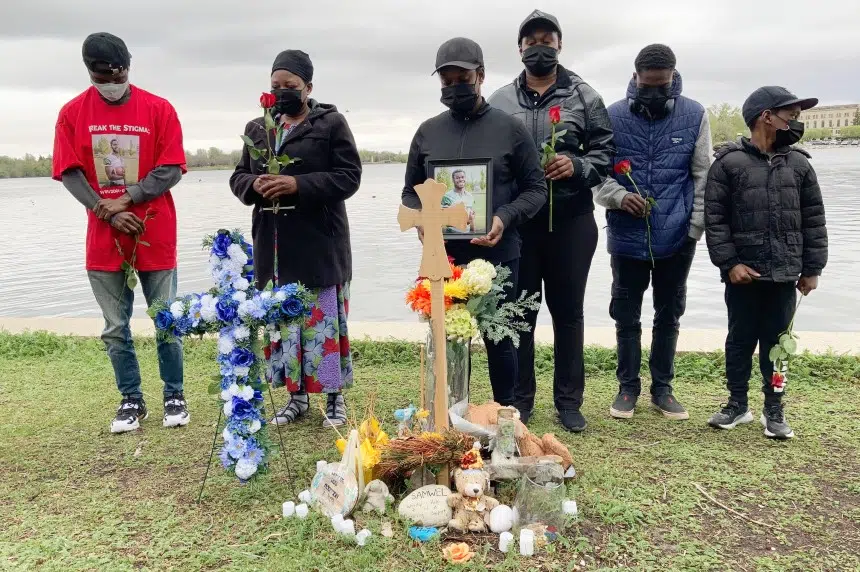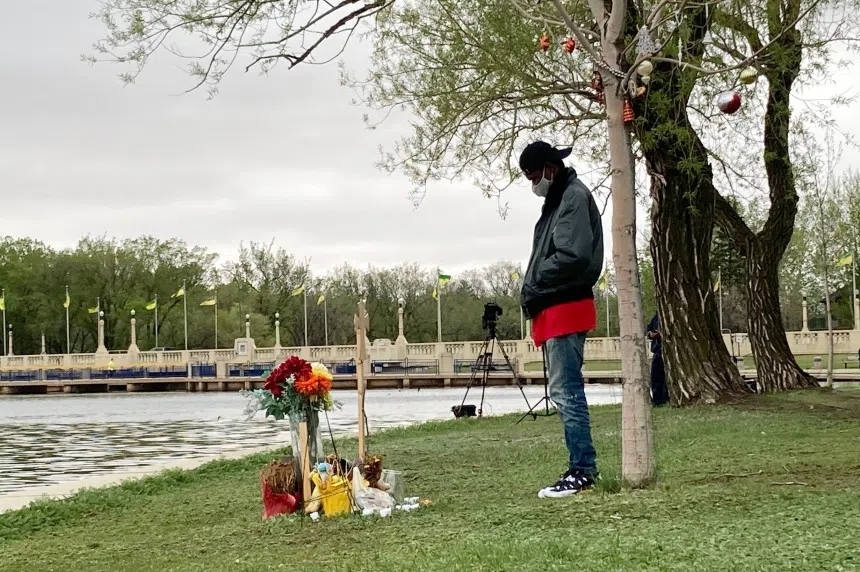Family and friends of Samwel Uko met in Regina’s Wascana Park on Friday for a memorial commemorating the first anniversary of 20-year-old Uko’s death, which raised concerns about mental health care in the province.
The small group gathered near the Legislative Building then proceeded on a walk to the north side of Wascana Lake, where a memorial had been built. They sang, prayed, held a moment of silence and laid roses by the shrine.
After a year, the grief was still fresh.
“I love you, I can’t sleep, I can’t eat, I always think about you,” cried one woman.
Family friend Muna DeCiman said Uko’s loved ones are heartbroken.
“Because a young fellow who had a lot of potential was taken away from us in a very sad way,” DeCiman said.
“He went to a place of refuge, a place to help, but instead he went to seek his death.”
A shrine has been built on the north side of Regina’s Wascana Lake paying tribute to Samwel Uko. The young man died May 21, 2020 in an apparent suicide. Hours before, Uko had been twice denied care at a Regina hospital. (Joseph Ho/980 CJME)
Uko was from Abbotsford, B.C. and played football for the University of Saskatchewan Huskies. Last year, he was in Regina to visit family. According to his relatives, he woke up saying he was hearing voices in his head and that people were coming to kill him.
According to his family, Uko tried twice to get mental health care at the hospital the day he drowned in Wascana Lake in an apparent suicide. The Saskatchewan Health Authority said Uko was “improperly denied care,” with a video provided to the family showing Uko crying for help while being forcibly removed by security.
“He was treated like an animal. We want those people to be held accountable for the deeds they did. They drove Samwel Uko to his death,” Deciman said.
At the time of its apology last July, the SHA said there were no terminations or disciplinary steps regarding the incident.
Uko’s family has filed a lawsuit against the SHA as well as the provincial government, claiming negligence on the part of the defendants by failing to create policies and guidelines to treat patients with mental health problems.
A Saskatchewan Coroners Service has also decided to hold an inquest into Uko’s death.
In its apology, the SHA said there were multiple factors that led to how Uko was treated, including conflicting information on his identity and that the process for registering an unidentified patient was not followed. As well, there were problems with information sharing with key stakeholders (Uko was taken to hospital by police officers) and the process of removing patients and visitors.
A statement from the health authority Friday said all recommendations that came in wake of Uko’s death have been implemented.
It was a six-step plan, with some of the highlights including improving registration and triage processes, better information sharing with key external partners, making sure non-clinical staff speak to a doctor before removing a patient from the emergency department and ensuring patients get “timely access” to an emergency psychiatric nurse.
The SHA also said it was committed to improving mental health support and cultural responsiveness, to better serve the city’s diverse population.
DeCiman believes that, as a Black man, Uko’s race contributed to how he was treated.
“Treat everybody the same and we hope the hospital will be culturally sensitive and they will ask for help when they know they’re not able to help the patient that comes to the hospital that doesn’t look like them,” she said.
“We need to have a sense of knowing how different cultural people behave when they have mental health (problems) … don’t stigmatize somebody who comes to the hospital because they say, ‘I am sick. I need help.’”
In the provincial government’s 2021 budget, $458 million was allocated for mental health and addictions, an increase of $23 million from the year before.
— With files from the Canadian Press and 980 CJME








